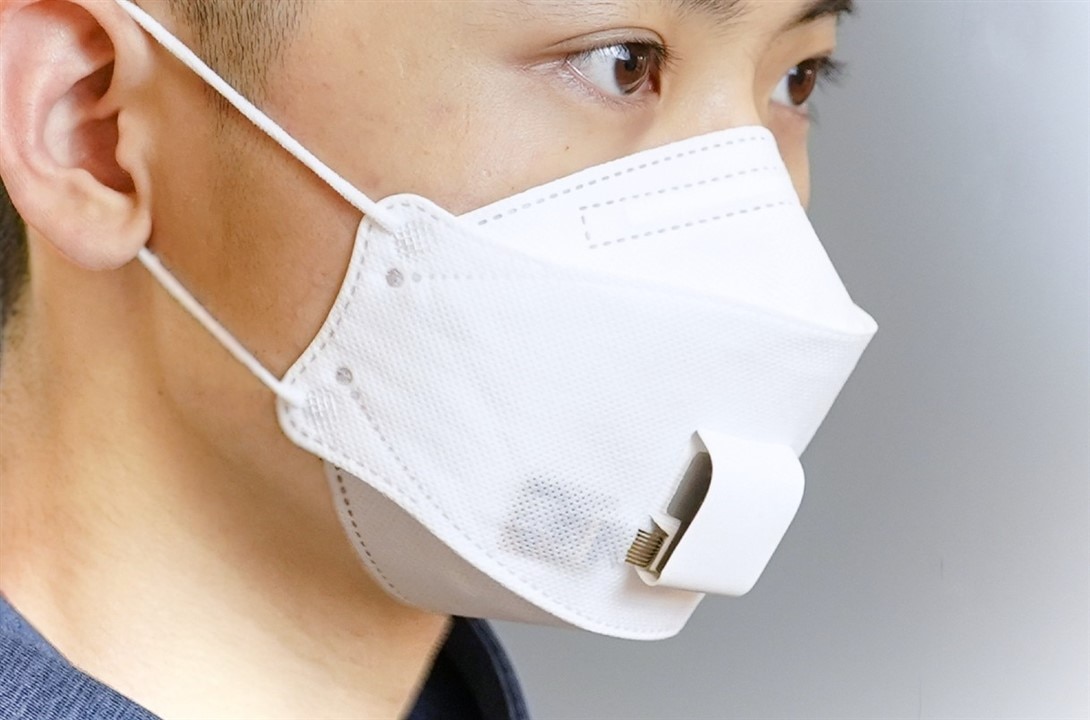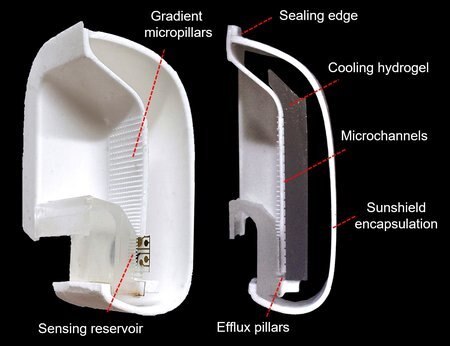
The EBCare mask measures biomarkers in the wearer’s breath. (Image Credit: Caltech/Wei Gao and Wenzheng Heng)
Scientists at the California Institute of Technology recently created a smart mask prototype that monitors exhaled breath condensate (EBC) and other biomarkers simultaneously in real-time. The EBCare mask is packed with an electrochemical sensor array, a wireless reading circuit, and an automated microfluidic system.
Both the microfluidic and cooling designs enable EBC collection and transportation for quantitative analysis. Meanwhile, the incorporated electrochemical biosensors improve performance by providing detailed molecular insights.

The mask consists of a hydrogel that cools the breath into a liquid, microchannels for liquid transportation, and a sensor reservoir for sample analysis. (Image Credit: Caltech/Wei Gao and Wenzheng Heng)
The team tested the EBCare mask on 31 healthy people: twelve who recovered from COVID-19, ten smokers, ten with asthma, and nine with COPD. During a 14-hour study, the volunteers wore the smart mask while napping, exercising, drinking, and performing office work.
The mask detected a slight reduction and increase in ammonium concentration after the participants ate breakfast. After consuming a protein-rich lunch and dinner, the mask detected a rise in those levels. Drinking alcohol leads to a rapid EBC alcohol concentration, which is comparable to blood alcohol concentration.
Those experiencing airway inflammations, including asthma, had a rise in nitrite levels, and this could indicate that EBC nitrite can diagnose, monitor, or manage the patients. The researchers tested the EBCare sensors against fractional exhaled nitric acid (FeNO) and discovered that 31 people had a strong correlation between EBC nitrite and FeNO. According to the researchers, COPD patients with a heightened EBC ammonium possibly had a higher serum urea. A reduction in EBC pH may indicate airway acidification in those with asthma.
Although different methods exist for measuring ammonia, nitrite, pH, and alcohol, the researchers showed those biomarkers are measured in EBC. The team’s EBC mask shows promise as a clinical application. More studies need to be carried out to determine if the mask can perform other measurements and assist with monitoring, diagnosis, and follow-ups.
The team’s next goal involves expanding the EBC mask’s biomarkers and running additional trials to verify whether it can be used in diverse settings. Additionally, they want to improve the mask to make it more affordable for large-volume production and integrate data analytics.
Have a story tip? Message me at: http://twitter.com/Cabe_Atwell
